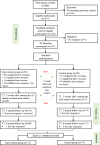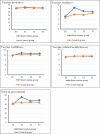Effects of a Theory- and Evidence-Based, Motivational Interviewing-Oriented Artificial Intelligence Digital Assistant on Vaccine Attitudes: A Randomized Controlled Trial
- PMID: 40779743
- PMCID: PMC12334111
- DOI: 10.2196/72637
Effects of a Theory- and Evidence-Based, Motivational Interviewing-Oriented Artificial Intelligence Digital Assistant on Vaccine Attitudes: A Randomized Controlled Trial
Abstract
Background: Attitude-targeted interventions are important approaches for promoting vaccination. Educational approaches alone cannot effectively cultivate positive vaccine attitudes. Artificial intelligence (AI)-driven chatbots and motivational interviewing (MI) techniques show high promise in improving vaccine attitudes and facilitating readiness for vaccination.
Objective: This study aimed to evaluate the effectiveness of a theory and evidence-based, MI-oriented AI digital assistant in improving COVID-19 vaccine attitudes among adults in Hong Kong.
Methods: This 2 parallel-armed randomized controlled trial was conducted from October 2022 to June 2024. Hong Kong adults (N=177) who were vaccine-hesitant were randomly assigned into 2 study groups. The intervention group (n=91) interacted with the AI digital assistant over 5 weeks, including receiving a web-based education program comprising 5 educational modules and communicating with an AI-driven chatbot equipped with MI techniques. The control group (n=86) received WhatsApp (Meta) messages directing them to government websites for COVID-19 vaccine information and knowledge, with the same dosage as the intervention group. Primary outcomes included vaccine hesitancy. Secondary outcomes included vaccine readiness, confidence, trust in government, and health literacy. Outcomes were measured at baseline, postintervention, 3-month, and 6-month follow-up. Focus group interviews were conducted postintervention. Intervention effects were analyzed using the generalized estimating equation model. Interview data were content analyzed.
Results: Decreases in vaccine hesitancy were observed while no statistically significant time-by-group interaction effects were found. The intervention showed significant time-by-group interaction effects on vaccine readiness (P=.04), confidence (P=.02), and trust in government (P=.04). Significant between-group differences with medium effect sizes were identified for vaccine readiness (Cohen d=0.52) and trust in government (Cohen d=0.54) postintervention, respectively. Increases in vaccine-related health literacy were observed, and a significant time effect was found (P=.01). In total, three categories were summarized from interview data: (1) improved vaccine literacy, confidence, and trust in government; (2) hesitancy varied while readiness improved; and (3) facilitators, barriers, and recommendations of modifications on the intervention.
Conclusions: The intervention indicated promising yet significant effects on vaccine readiness while the effects on vaccine hesitancy require further confirmation. The qualitative findings; however, further consolidate the significant effects on participants' attitudes toward vaccines. The findings provide novel evidence to encourage the adoption and refinement of a MI-oriented AI digital assistant in vaccine promotion.
Keywords: COVID-19; artificial intelligence; attitude; chatbot; motivational interviewing; vaccine hesitancy.
© Yan Li, Mengqi Li, Janelle Yorke, Daniel Bressington, Joyce Chung, Yao-Jie Xie, Lin Yang, Mengting He, Tsz-Ching Sun, Angela Y M Leung. Originally published in the Journal of Medical Internet Research (https://www.jmir.org).
Conflict of interest statement
Figures
References
-
- Vaccines and immunization. World Health Organization. 2024. [16-02-2024]. https://www.who.int/health-topics/vaccines-and-immunization#tab=tab_1 URL. Accessed.
Publication types
MeSH terms
Substances
LinkOut - more resources
Full Text Sources
Medical





